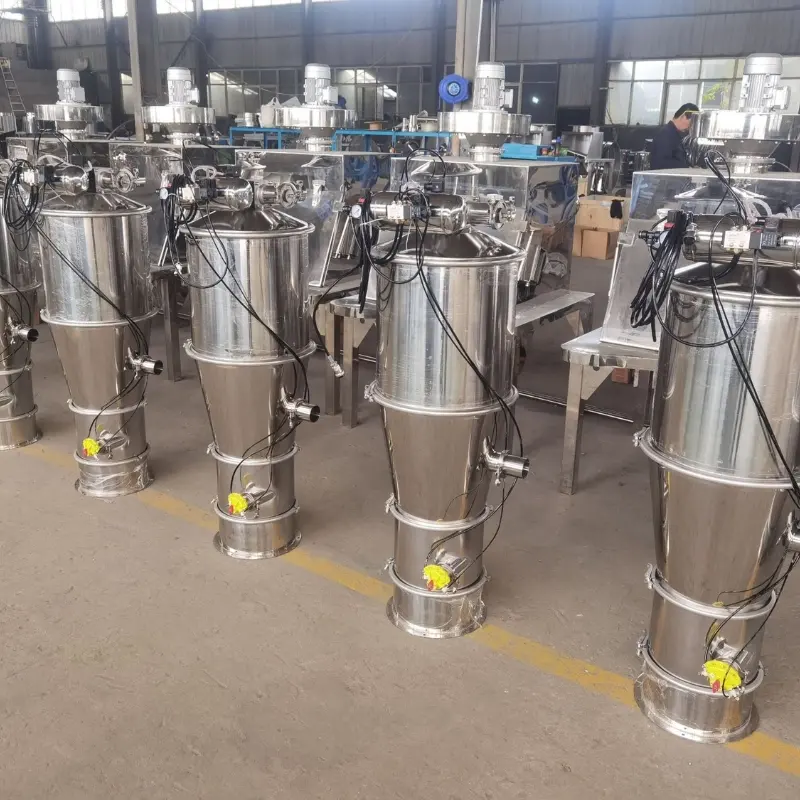Achieving Precision Control: The Application of Micro-flow Loss-In-Weight Feeder in the Plastics Industry
Release time: 2025-04-22
In the plastics industry, the precision of material handling and formulation directly impacts the quality, cost, and efficiency of the final product. The micro-flow loss-in-weight feeder, as an advanced metering and control device, enables precise material mixing, ensuring high efficiency and stability in production. Below are the key applications and advantages of this device in the plastics industry:
1. Precise Material Formulation and Control
In plastic production, especially in mixing and extrusion processes, precise ratios of various raw materials (such as resins, additives, fillers, stabilizers, etc.) need to be maintained. The micro-flow loss-in-weight feeder monitors and controls the flow of each material in real-time, ensuring accurate ratios, which in turn guarantees the consistency of the final plastic product’s quality.
Advantage: Through precise metering, it reduces product quality fluctuations caused by uneven formulation, minimizing waste and rework, and improving overall production efficiency.
2. Reducing Material Waste and Lowering Costs
In traditional feeding systems, imprecise material ratios often lead to overuse or underuse of raw materials, resulting in waste. The micro-flow loss-in-weight feeder, with its loss-in-weight technology, offers superior precision and speed. It can control the flow of materials batch by batch, minimizing unnecessary waste.
Advantage: By reducing material waste, production costs are lowered, especially when dealing with high-cost or additive-intensive materials, leading to significant savings.
3. Stable Production Process
Plastic processing typically requires high stability, particularly in extrusion, blow molding, and injection molding. The micro-flow loss-in-weight feeding system allows for real-time adjustment of material feeding, ensuring consistent material supply, and minimizing production disruptions and quality variations caused by uneven material feed.
Advantage: Increased production process stability, fewer production line shutdowns, and less frequent equipment maintenance, enhancing overall production efficiency.
4. Adaptability to Various Raw Materials
The plastics industry uses a wide range of raw materials, including different types of plastic pellets, powders, liquids, and additives. The micro-flow loss-in-weight feeder’s flexibility allows it to meet the feeding requirements of various materials, adjusting feeding parameters to ensure accurate delivery during production.
Advantage: The device’s strong adaptability allows it to accommodate different materials and adjust to diverse production needs, enhancing flexibility and versatility in the production line.
5. Reducing Manual Intervention, Enhancing Automation
The micro-flow loss-in-weight feeder is typically integrated with automated control systems, enabling it to adjust the material feed automatically based on preset formulas and production needs, reducing reliance on manual operations. This not only improves efficiency but also minimizes human error.
Advantage: Increased automation reduces dependence on manual labor and improves the reliability of the entire production process.
6. Optimizing Product Quality
In the plastics industry, product performance (such as strength, toughness, heat resistance, etc.) often depends on the precise formulation of raw materials. By using the industrial micro-flow loss-in-weight feeders, each batch of material can be ensured to meet strict specifications, significantly improving the uniformity and stability of the product quality.
Advantage: With precise formulation, it ensures that plastic products meet customer requirements, enhancing market competitiveness.
7. Environmental Friendliness and Sustainable Production
As environmental regulations become stricter, reducing resource waste and pollutant emissions has become a critical challenge in the plastics industry. The micro-flow loss-in-weight feeder not only reduces material waste but also lowers energy consumption by ensuring precise material metering. This device helps the plastics industry move toward more environmentally friendly and sustainable production models.
Advantage: By increasing material utilization and reducing energy consumption, it helps the plastics industry achieve greener and more sustainable production practices.
As an efficient material metering and control device, the micro-flow loss-in-weight feeder plays an irreplaceable role in the plastics industry, whether in improving production efficiency, reducing costs, or ensuring product quality and optimizing the production process. Its precision control capabilities provide plastics companies with a more refined, automated, and environmentally friendly production model, making it a key technology for enhancing production competitiveness.


